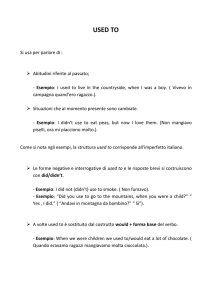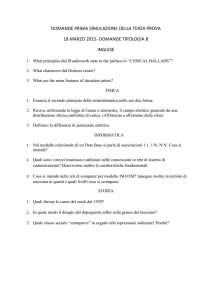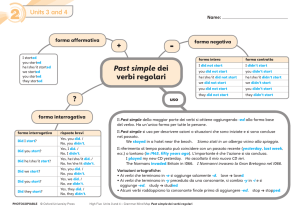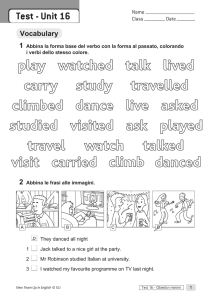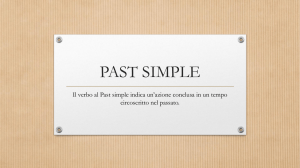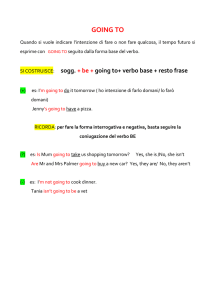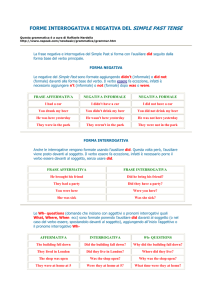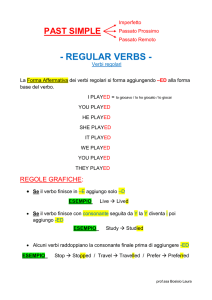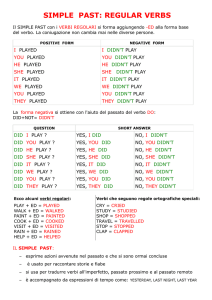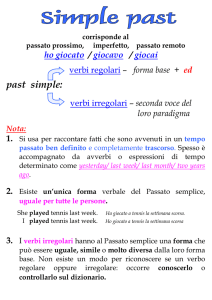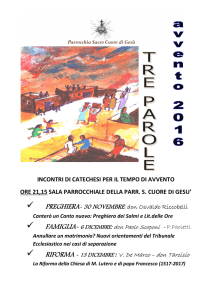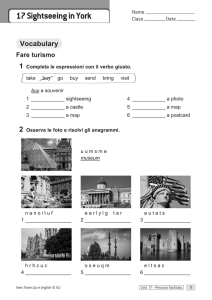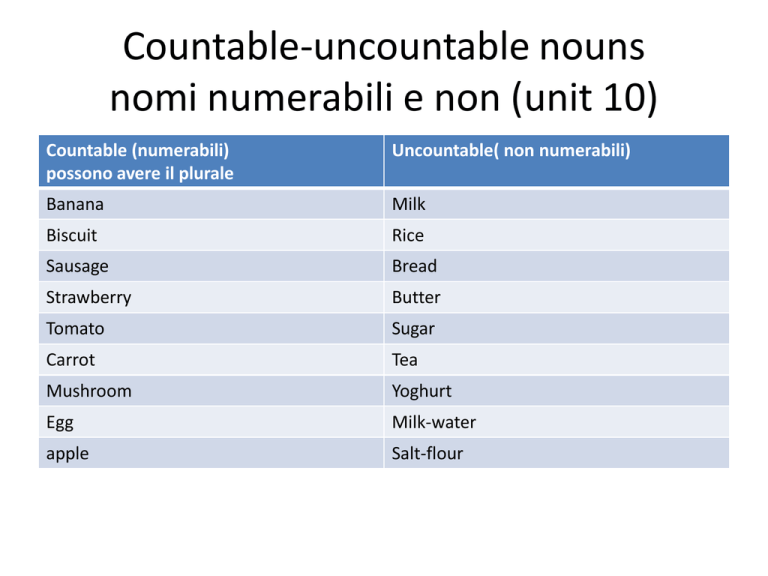
Countable-uncountable nouns
nomi numerabili e non (unit 10)
Countable (numerabili)
possono avere il plurale
Uncountable( non numerabili)
Banana
Milk
Biscuit
Rice
Sausage
Bread
Strawberry
Butter
Tomato
Sugar
Carrot
Tea
Mushroom
Yoghurt
Egg
Milk-water
apple
Salt-flour
Uncoutable nouns( U.10)
• Gli uncountable nouns sono quei nomi che
non possono avere un plurale se non con un
nome davanti es.
• Two cups of tea
• Three spoons of sugar
• 4 litres of water
• 5 kilos of flour
Molto(U.9)
MUCH
MANY
A LOT OF
Domande con nome non
numerabile-uncountable
Domande con nome al
plurale
Frase affermativa con
nome non numerabileuncountable
frase negativa con nome
non numerabileuncontable
Frase negativa con nome al Frase affermativa von
plurale
nome al plurale
Esempi (U.10)
•
•
•
•
•
Is there much bread?c’è del pane?
Yes,there’s a lot of bread Si c’è molto pane
Are there many strawberries?
Ci sono molte fragole?
Yes,there are a lot of strawberries
Partitivo
some-any(u.10)
• Con i nomi numerabili si può usare l’articolo
indeterminativo a-an, ma con i nomi non
numerabili si usa
• Some= frase affermativa
• Any
frase negativa
domanda
Esempi (U.10)
•
•
•
•
•
I eat some bread= mangio del pane
We don’t drink any water
Non beviamo dell’acqua
I eat a bananas
Mangio una banana
Verbi che reggono ing (U.9)
• Alcuni verbi vogliono che il verbo che c’è dopo
finisca con ing, questi verbi sono:
• Like
• Love
• Hate
• prefer
Esempi (U.9)
•
•
•
•
•
I like studying=mi piace studiare
You prefer playing= tu preferisci giocare
He hates running=lui odia correre
We love eating= Noi amiamo mangiare
What do they like doing? Cosa pice fare a
loro?
• We don’t like listening to you= non ci piace
ascoltarti
Possessive pronouns
pronomi possessivi U.10
• Noi già conosciamo gli aggettivi possessivi
• My,your,his,her,our,your,their)
• e ci ricordiamo che
1) vanno prima del nome,
2) non hanno l’articolo e
3) c’è un’unica forma per il maschile, femminile
singolare e plurale.
Diversamente i pronomi non avranno mai il nome
dopo ,ma lo sostituiscono
Possessive pronouns
rules= regole U. 10
Mine-yours-his-hers-ours-yours-theirs
1) Non hanno mai il nome dopo
questo è il mio libro, quello è il tuo:
2) non hanno l’articolo e
3) c’è un’unica forma per il maschile, femminile
singolare e plurale
This is my book, that is yours
Regola U.10
4) Non sono mai preceduti da:
Numeri
Due miei amici sono americani
Per poter inserire il numero,si deve mettere prima del
possessivo la preposizione of:
Two friends of mine are American
oppure
Two of my friends are American
E così di seguito
Partitivi-indefiniti alcuni suoi parenti vengono dalla
Spagna= some relatives of his come from Spain
WHICH-WHAT(U.9)
•
•
•
•
Which books do you buy?
What books do you buy?
Quale libri compri?
Entrambi hanno lo stesso significato ma si usa
il primo se la scelta è ristretta, il secondo
quando c’è un’ampia scelta
WHOSE( U.9)
•
•
•
•
•
•
•
Whose=di chi?
Ci sono 2 costruzioni:
1)whose +be+agg.dim.+ nome
2)whose +nome+be+pron..dim.
Esempi:
Whose is this bag?
Whose bag is this?
Past simple(U.11)
• Questo tempo corrisponde in italiano al
• Passato prossimo
• Imperfetto
• Passato remoto
• Abitualmente c’è la specificazione di tempo
La regola generale si ottiene mettendo ed alla
forma base del verbo: look
We looked
PERò (U.11)
Però se il verbo ha già la e finale basta
aggiungere d
Es. love
I loved
Y preceduta da consonante si traforma in ied
Es.study
You studied
I mono/bisillabi che terminano in vocale
accentata + consonante reddoppiano
Past simple(U.11)
• Es.stop stopped
• Travel travelled
• Prefer preferred
• Le persone sono tutte uguali
Forma interrogativa(U.11
• La forma interrogativa è abbastanza semplice.
• Ricordate la forma del presente? DO?
• Si trasforma in DID uguale per tutte le
persone
• Did you study yesterday?
FORMA NEGATIVA U.12
• E così vi ricordate la forma negativa
DON’T –DOESN’T?
Entrambi diventano
DIDN’T
Es. They didn’t study yesterday
Pas simple U.12
Schema della frase U.12
0) Interrogative pronoun
1) Did
2) Subject
3) Basic verb
Where did they stay yesterday?
Risposta breve: Yes, 2+1
IRREGULAR VERBS U.12
Dates u.11
•
•
•
•
•
•
•
•
My son was born = mio figlio è nato
In 2002(anno)
In November (mese)
On November the 5° (mese+ giorno)
On the 5th of November ( giorno + mese)
In the morning( parte del giorno)
At 5 o’clock( orario)
At night
Dates u.11
• Gli anni si leggono a coppie fino al 1999
Es: 1963= nineteen sixty three
Ma 1900=nineteen hundred ( come se fosse
19x100)
Ma 1905=nineteen oh five( lo 0 si legge =oh)
How deep is the lake? U.11
• Vi ricordate la domanda : quanti anni hai?
• How old are you? E nella risposta mettete old
alla fine?
• Esatto, così si fa con tutti gli aggettivi
preceduti da how.
• Quindi risponderemo:
• The lake is 50 metres deep
Comparativo u.12
• Per usare il comparativo di maggioranza bisogna
stare attenti se l’aggettivo ha
• 1 e 2 sillabeterminanti con er-ow-le
• si aggiunge ER=
• shorter-cleverer-narrower-simpler
• Consonante+y= ier
• 3-4-5- sillabe ( si mette davanti MORE)
• Good= better
Bad = worse
• Much-many=more
little= less
Comparativo di qualità
( aggettivi) U.12
• Maggioranza:
• More-agg.+er + Than con 2° termine di
paragone
• Uguaglianza:
• As+ aggettivo-as+2°termine di paragone
• Minoranza:
• Less + agg.+than +2°termine di paragone
Esempi comparativi U.12
•
•
•
•
Japanese is more difficult than English
London is larger than Varese
Milano is as big as Rome
Rome is less big than Rome
Comparativo di quantità
nomi
•
•
•
•
•
•
•
•
Equality= uguaglianza
As much……..as ( uncountable nouns)
He drinks as much milk as me at breakfast
Lui beve tanto latte quanto me a colazione
Con nomi al plurale
As many…..as
My sister reds as many books as me
Mia sorella legge tanti libri quanto me
•
•
•
•
Con avverbi
As much as
I work hard as much as you
Lavoro sodo-tanto quanto te
Superlativi U.12
• Nel superlativo si mette prima l’articolo the
davanti e dove nel comparativo si metteva er
adesso si mette EST ,
• E dove c’era more si mette THE MOST
• Good=the best Bad=the worst
esempi:
Collecting cards is the most interesting hobby
Cooking is the best hobby at all
secondo termine di paragone U.12
•
•
•
•
Se il paragone si fa con un gruppo si mette
OF= she is the nicest of my friends
Se riguarda uno spazio si mette IN=
mount Everest is the highest mountain in the
world
Futuro intenzionale U.13
• Quando vogliamo esprimere l’intenzione di
fare qualcosa nel futuro si mette davanti al
verbo la costruzione
Be going to ( non deve essere tradotto,
ma serve per capire che il verbo dopo va
al futuro)
il verbo to be si coniuga normalmente
( I am, you are, I’m not, you aren’t, Am I? are
you? Ecc.)
ESEMPI U.13
• Mangerò=
I’m going to eat(ho intenzione di mangiare nel
futuro ,ma non so esattamente quando)
Non ti incontreremo=
We aren’t going to meet you
• Quando cenerete?
When are you going to have dinner?
Altro uso di be going to U.13
•
•
•
•
•
Per indicare un’azione che sta per accadere:
Look at those black clouds!
Guarda queste nuvole nere
I think it’s going to rain soon
Pioverà presto
Futuro programmato U.13
• Invece se abbiamo già deciso quando agire nel
futuro si deve usare il tempo del
present continuous, ma con valore di futuro e
ci sarà la specificazione di tempo, es.
• Tonight- tomorrow-next week-next month• The day after tomorrow( dopodomani)• On Monday……
Esempi U.13
• On Saturday I’m watching a film=
Sabato vedrò un film
Next summer we aren’t going to Paris=
La prossima estate non andremo a Parigi
When are they going to leave?
Quando partiranno? ( intenzione )
They are going to leave the day after tomorrow
Partiranno dopodomani
Must-have to
dovere U.14-15
• Nella forma affermativa
must e have to hanno lo stesso significato,
Indicano obbligo di fare qualcosa
• Nella forma negativa
Mustn’t si usa per esprimere una proibizione
Don’t-doesn’t have to si usa per esprimere
qualcosa che non è obbligatorio-non è necessario
Funzioni comunicative u.13
Per esprimere un suggerimento
• Proporre attività
si utilizzano le funzioni comunicative seguenti:
Shall we go to the cinema?= andiamo al cinema?
Let’s go to the cinema= andiamo al cinema
Why don’t we go to the cinema?
what about going to the cinema?
Answer-risposta U.13
•
•
•
•
•
•
•
•
Accetta
Yes, ok
Good idea
That’s lovely
Controproposta
What about+ ing
Why don’t we
Let’s
rifiuta
no,thanks
sorry. I can’t
no,I don’t like
Esempi U.13
• Dobbiamo mangiare per vivere =
• We must-have to eat to live
il film inizia alle 7= we don’t have to meet at
6.00
Hai una punizione = you mustn’t go out
non devi uscire
May= potere
• May possiede solo l’uso del present simple e ha unica
forma per tutte le persone
• I-you-she-he-it-we-you-they MAY (neg.aggiungo NOT)
• Interr.MAY I-you-she-he-it-we-you-they?
quando?
1) Per fare una richiesta
2) Per chiedere il permesso di compiere un’azione in
modo formale
e.g. May I go out,please?
Posso uscire per favore?
may
• 3)per indicare la probabilità che un’azione
abbia luogo
• E.g. He is late ,he may be stuck in a traffic
jam.
• Lui è in ritardo, può essere bloccato in un
ingorgo
Past simple U.11
AFFERM.
NEGAT.
INTERR.?
WALK
WALKED
DIDN’T
WALK
DID I
WALK?
LIKE
LIKED
DIDN’T
LIKE
DID YOU
LIKE?
PLAY
PLAYED
DIDN’T
PLAY
DID SHE
PLAY?
STUDY
STUDIED
DIDN’T
STUDY
DID WE
STUDY?
STOP
STOPPED
DIDN’T
STOP
DID YOU
STOP?
TRAVE
L
TRAVELLED
DIDN’T
TRAVEL
DID THY
TRAVEL?
IRREGULAR PAST SIMPLE U.12
AFFERMATIVA
NEGATIVA
INTERROGATIVA
TO GO
I WENT
I DIDN’T GO
DID I GO?
TO WRITE
YOU WROTE
YOU DIDN’T WRITE
DID YOU WRITE?
TO THINK
SHE THOUGHT
YOU DIDN’T THINK
DID SHE THINK?
TO SWIM
WE SWAM
WE DIDN’T SWIM
DID WE SWIM?
FUTURO
TIPO
FORMA
USO
ESEMPIO
INTENZIONALE
BE GOING TO
1) INTENZIONE
2) STA X
ACCADERE
1) I’M GOING TO
EAT PIZZA
2) IT’S GOING TO
RAIN ( THE
CLOUDS ARE
BLACK)
PROGRAMMATO
BE + ING
AZIONE
PROGRAMMATA
I’M LEAVING THIS
SUMMER
WILL
WIIL + FORMA BASE 1) PREVISIONE
2) PROMESSADECISIONEOFFERTA PRESA
AL MOMENTO
1) ITALY WILL WIN
THE MATCH
2) I’LL DO MY
HOMEWORK
LATER
MODAL VERBS
CAN
MAY
COULD
MIGHT
SAPER FARE:
I CAN SWIM
FARE UNA
RICHIESTA
MAY I HAVE A CUP
OF TEA,PLEASE?
SAPER FARE AL
PASSATO:
I COULD CLIMB,
WHEN I WAS 5
PROBABILITA’
+ FORMALE
CHIEDERE UN
PERMESSO(INFOR
MALE)
CAN I GO TO THE
TOILETS,PLEASE?
CHIEDERE UN
PERMESSO IN
MODO FORMALE
MAY I GO TO THE
TOILETS, PLEASE?
POTREI ,RICHIESTE
FORMALI
PERIODO
IPOTETICO
PROBABILITA’:
HE MAY BE STUCK
DOVERE
AFFERMATIVO
NEGATIVO
MUST
OBBLIGO
YOU MUST STUDY
HAVE TO
OBBLIGO
YOU HAVE TO
STUDY
MUSTN’T
PROIBIZIONE
YOU MUSTN’T GO
OUT
DON’T-DOESN’T
HAVE TO
NON è
OBBLIGATORIONECESSARIO
WE DON’T HAVE TO
GO TO SLEEP AT 8,
IT’S SATURDAY

